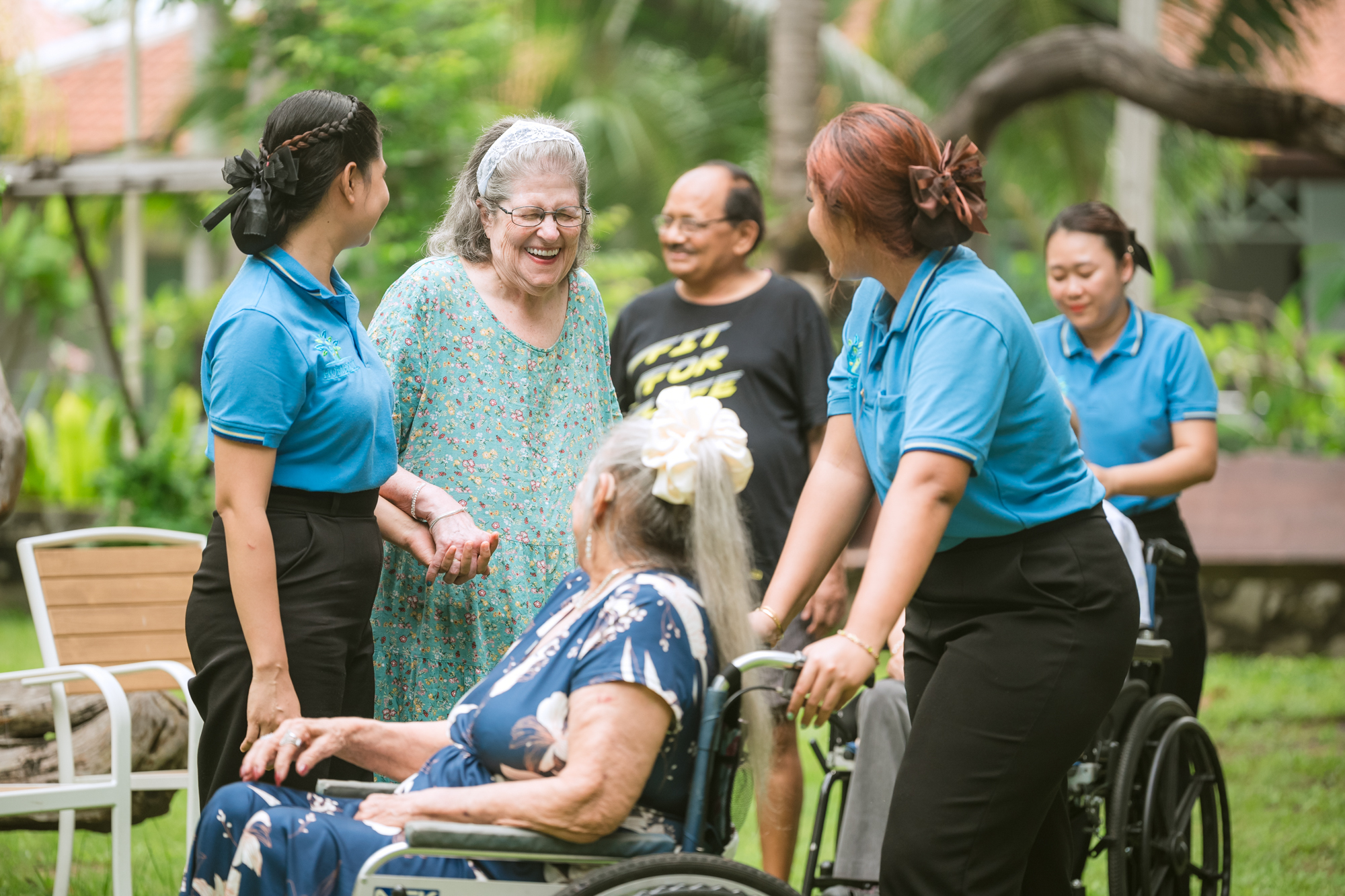
태국이 은퇴한 외국인들에게 인기 있는 안식처가 되면서 다양한 노인 생활 커뮤니티 전국 곳곳에 생겨났습니다. 리조트 스타일의 은퇴자 마을부터 집중 치료를 제공하는 요양원까지 다양합니다. 외국인 은퇴자(및 그 가족)를 위한 은퇴자 마을을 찾는다면 태국 최고의 시니어 생활, 선택이 부담스럽게 느껴질 수 있습니다. 어떤 커뮤니티가 적절한 케어, 편안함, 삶의 질을 제공할지 어떻게 판단할 수 있을까요? 이 가이드에서는 태국의 노인 생활 시설을 선택할 때 고려해야 할 주요 요소를 세분화하여 설명합니다. 이러한 요소를 염두에 두면 자신의 필요를 충족하고 집처럼 편안하게 지낼 수 있는 곳을 자신 있게 찾을 수 있습니다.
1. 케어 수준 및 의료 서비스
첫 번째 고려 사항은 케어 수준 필요한 서비스를 제공합니다. 태국의 시설마다 각기 다른 요구 사항을 충족하므로 노인의 건강 및 독립성 수준에 맞는 서비스를 제공하는 것이 중요합니다:
- 독립적인 생활: 대부분 자급자족하지만 커뮤니티 생활(식사, 집안일)과 사회 활동의 편리함을 원하는 노인에게 이상적입니다. 응급상황에 대비해 당직 간호사 등의 의료 지원을 받을 수 있지만, 독립 생활 커뮤니티는 주로 생활 방식에 관한 것입니다. 대규모 은퇴자 리조트의 일부가 될 수도 있습니다.
- 원호 생활: 일상 활동(목욕, 옷 입기, 약물 관리)에 도움이 필요하다면 생활 보조 시설을 찾아보세요. 태국에서 가장 좋은 시설은 다음과 같습니다. 24시간 연중무휴 간병인 및 간호사 상주. 직원 대 거주자 비율이 좋은지, 간병인이 적절한 영어를 구사하는지 확인하세요. 응급 상황에 어떻게 대처하는지, 의사가 정기적으로 방문하는지 물어보세요(많은 상위 커뮤니티는 매주 의사가 방문하고 당직 의사가 대기하고 있습니다).
- 전문 간호 또는 집중 치료: 의료적 도움이 필요하거나 거동이 불편한 경우 숙련된 간호 서비스를 제공하는 양로원이 필요합니다. 태국에는 서양의 양로원과 유사하지만 가정과 더 유사한 환경에서 24시간 간호를 제공하는 양로원이 있습니다. 치매 또는 알츠하이머 치료가 필요한 경우 시설에 다음이 있는지 확인하세요. 메모리 케어 프로그램 또는 인지 장애에 대한 교육을 받은 전문 직원에게 문의하세요.
- 재활 서비스: 은퇴자에게 재활 치료(수술 후, 뇌졸중 회복 등)가 필요한 경우 현장 물리 치료 또는 작업 치료가 가능한 곳을 고려하세요. 예를 들어, 홈리 시니어 리빙은 케어 프로그램의 일환으로 현장 물리치료 클리닉과 재활 서비스를 제공하며, 이는 이동성을 회복하고 유지하는 데 매우 유용할 수 있습니다.
커뮤니티를 평가할 때 커뮤니티에 대해 문의하세요. 의료 시설 및 프로토콜. 의무실이나 진료실이 있나요? 한밤중에 레지던트가 아프면 어떤 절차로 구급차를 불러 협력 병원으로 이송하나요? 상위 커뮤니티는 응급 상황에 대비한 명확한 절차와 자체 교통편까지 갖추고 있습니다. 또한 약물 관리와 정기적인 건강 검진을 지원하는지도 확인하세요.
커뮤니티의 품질이 좋다는 좋은 신호는 다음과 같은 경우입니다. 면허를 소지한 의료 전문가 - 예를 들어, 근무 중인 간호사(RN)와 치료 계획을 감독하는 의료 책임자 또는 의사가 있습니다. 직원 자격 증명에 대해 물어보는 것을 주저하지 마세요. 태국 최고의 시니어 리빙 홈은 국제 경험이 있거나 광범위한 교육을 받은 간호사를 고용하여 서구 표준 간호를 보장하는 경우가 많습니다.
2. 직원 자질 및 언어
따뜻함과 역량 직원 는 노후 생활의 성패를 좌우할 수 있습니다. 외국인 은퇴자라면 언어와 의사소통이 특히 중요합니다. 커뮤니티를 조사할 때는 이러한 점을 고려하세요:
- 언어 능력: 직원의 상당수, 특히 직접 돌봄과 관리를 담당하는 직원의 상당수가 영어(또는 선호하는 언어)를 구사할 수 있는지 확인하세요. 해외 은퇴자를 대상으로 하는 대부분의 커뮤니티는 영어를 구사하는 직원이 있다고 광고합니다. 투어를 통해 직원을 만나보면 이를 가늠해볼 수 있습니다. 의사소통은 일상적인 요구 사항을 표현하는 것부터 발생하는 문제를 처리하는 것까지 모든 것에 중요합니다.
- 교육 및 인증: 직원 교육에 대해 문의하세요. 간병인이 노인 케어 관련 자격증을 보유하고 있나요? 간호사가 등록되어 있나요? 응급 처치나 심폐소생술에 대한 자격증이 있나요? 평판이 좋은 시설은 이러한 정보를 기꺼이 공유할 것입니다. 예를 들어, 지속적인 교육 프로그램이나 국제 요양 기관과의 파트너십을 언급할 수도 있습니다.
- 직원의 태도 및 문화: 자격 요건 외에도 직원들이 주민들과 어떻게 상호작용하는지 관찰하세요. 태국 문화에서 노인을 돌보는 일은 존중과 온화함, 인내심을 바탕으로 이루어지는 경우가 많으므로 그 증거를 볼 수 있을 것입니다. 직원이 미소를 지으며 거주자를 맞이하나요? 세심하고 친절해 보이나요? 자비로운 케어 태국에서 가장 잘 알려진 커뮤니티는 직원들이 주민들을 친척처럼 대하는 가족 같은 분위기를 조성합니다.
- 직원 대 상주 인원 비율: 비율이 낮을수록(거주자당 직원 수가 많을수록) 일반적으로 더 많은 개인별 맞춤 서비스를 받을 수 있습니다. 최고 수준의 시설이라면 기꺼이 그 비율을 공유해야 합니다. 커뮤니티의 거주자 수에 비해 간병인 수가 너무 적다면 건물이 아무리 훌륭하더라도 간병의 질에 적신호가 켜진 것입니다. 자료에서 “24시간 돌봄, 높은 직원 대 거주자 비율'과 같은 표시를 찾아보세요.
3. 위치 및 환경
태국은 해변가부터 산속 휴양지까지 다양한 환경을 제공합니다. 태국은 위치 는 경관뿐 아니라 편의와 라이프스타일에도 영향을 미칩니다:
- 가족 또는 여행 허브와의 근접성: 가족이 자주 방문할 예정이라면 주요 공항과 가까운 것이 유리합니다. 예를 들어 파타야는 방콕의 수완나품 공항에서 차로 1시간 30분 거리에 있어 해외 여행객이 쉽게 방문할 수 있습니다. 치앙마이는 아름다운 도시이지만 환승 항공편이 필요할 수 있습니다. 사랑하는 사람들이 얼마나 쉽게 도착할 수 있는지 생각해 보세요.
- 기후: 태국 북부(치앙마이, 치앙라이)는 겨울이 서늘하고 습도가 낮은 반면 해안 지역(파타야, 푸켓, 후아힌)은 일 년 내내 따뜻합니다. 북쪽의 온화한 기온을 선호하는 은퇴자들도 있고 남쪽의 바닷바람을 좋아하는 은퇴자들도 있습니다. 예를 들어 치앙마이는 몇 달 동안 대기 오염이 심한 “불타는 계절'이 있는 반면, 해안 지역은 대기 질이 더 일정합니다.
- 주변 환경 및 설정: 어떤 환경에서 지내고 싶은지 결정하세요. 일부 커뮤니티는 녹지와 정원이 많은 고요한 전원 지역에 있어 평화와 자연을 만끽하기에 좋습니다. 마을과 가까워 상점과 레스토랑이 가까운 곳도 있습니다. 태국에는 산, 호수 옆, 한적한 교외 또는 해변 근처에 위치한 은퇴자 주택이 있습니다. 도시의 활기를 좋아한다면 방콕에도 일부 시설이 있지만, 많은 외국인들은 차분한 제2의 도시를 선택합니다.
- 시설 및 편의시설: 커뮤니티의 물리적 환경은 일상의 행복을 위해 중요합니다. 커뮤니티를 선택할 때는 편의시설을 살펴보세요: 멋진 정원이나 산책로가 있나요? 수영장이나 피트니스 공간이 있나요? 건물과 방이 현대적이고 잘 관리되어 있나요? 예를 들어, 홈리 시니어 리빙은 다음과 같은 서비스를 제공합니다. 리조트 스타일 생활 해수 수영장, 클럽하우스, 구내 레스토랑 등의 시설을 갖추고 있어 고급스러운 분위기를 선사합니다. 편의시설이 많은 대형 캠퍼스를 원하는지, 아니면 작고 아늑한 공간을 원하는지 생각해 보세요. 수영을 좋아한다면 수영장은 필수이고, 독서를 즐긴다면 도서관이나 조용한 라운지가 있는지 확인하는 등 자신의 관심사에 맞는 시설을 갖추고 있는지 확인하세요.
또한 접근성 환경을 고려하세요: 경사로, 엘리베이터, 휠체어 친화적인 경로가 있나요? 지금은 이동이 편리하더라도 나중에 이러한 기능이 중요해질 수 있습니다. 최고의 시설은 미끄럼 방지 바닥, 복도의 손잡이, 객실과 욕실의 비상 호출 버튼 등 고령자의 접근성을 염두에 두고 지어졌습니다.
4. 커뮤니티 생활 및 사회 활동
만족스러운 은퇴는 돌봄뿐만 아니라 커뮤니티와 지속적인 참여에 관한 것입니다. 커뮤니티가 다음과 같은 측면에서 무엇을 제공하는지 평가하세요. 사회 생활 및 활동:
- 활동 프로그램: 활동 일정이나 이벤트의 예를 요청하세요. 운동 수업, 미술 및 공예, 음악, 정원 가꾸기, 게임, 영화의 밤과 같은 일일 또는 주간 활동이 있나요? 많은 태국 시니어 커뮤니티는 활동적인 라이프스타일을 강조하기 때문에 태국 요리 교실, 언어 수업, 지역 명소로의 단체 여행과 같은 프로그램을 찾을 수 있습니다. 다양한 활동은 모두를 위한 무언가를 보장하고 거주자들이 신체적, 정신적으로 활동적인 상태를 유지할 수 있도록 도와줍니다.
- 여행 및 외출: 훌륭한 시설은 해변, 사원, 쇼핑몰, 공원 등 외부 여행을 계획할 수 있습니다. 이는 생활에 활기를 불어넣어 줍니다. 예를 들어 치앙마이의 일부 지역에서는 인근 코끼리 보호구역이나 문화 유적지를 방문하고, 파타야에 위치한 커뮤니티에서는 해변 피크닉이나 쇼핑몰 나들이를 준비할 수 있습니다. 얼마나 자주 나들이를 하는지, 나들이에는 어떤 것들이 포함되는지 알아보세요.
- 커뮤니티 문화: 문화를 느껴보세요. 여러 나라에서 온 외국인 거주자가 많은 국제적인 지역인가요? 다른 거주자들과 공통의 언어나 배경을 공유할 수 있다는 점이 위안이 될 수 있습니다. 일부 커뮤니티는 태국인 거주자가 더 많지만 여전히 외국인을 환영할 수도 있습니다. 어느 쪽도 나쁘지 않으니 어떤 것이 편한지 알아두세요. 국제적인 커뮤니티에서는 송끄란과 같은 태국 축제 외에도 크리스마스, 새해 등 다양한 명절을 축하하고 다양한 이야기를 나눌 수 있습니다. 예를 들어, 호머리는 다음과 같은 자부심을 가지고 있습니다. 활기찬 커뮤니티 분위기 주민들이 친밀한 우정을 쌓고 다문화 경험을 공유하는 곳입니다.
- 방문 및 가족 참여: 방문자 관련 정책을 확인하세요. 좋은 커뮤니티는 가족 방문을 장려하고 방문객을 위한 객실이나 인근 호텔을 제공하기도 합니다. 가족에게 정기적으로 업데이트(사진, 건강 보고서)를 보내는 곳도 있어 가족이 해외에 있는 경우 안심할 수 있습니다. 가장 좋은 곳은 가족도 커뮤니티의 일원으로 대하며, 이벤트에 초대하거나 거주자의 안녕에 대해 열린 소통 창구를 유지합니다.
- 음식 및 식사 경험: 사회생활은 종종 식사를 중심으로 이루어지므로 식사를 간과해서는 안 됩니다. 커뮤니티에서 식사를 제공하는데 맛이 좋은가요? 다양한 입맛을 만족시킬 수 있도록 태국식과 서양식 옵션을 모두 제공하는 것이 이상적입니다. 식사는 주민들이 담소를 나눌 수 있는 공동 식당이나 일부 고급 숙소처럼 단품 레스토랑 스타일의 서비스를 제공하는 등 즐거운 경험이어야 합니다. 식단 제한이 있는 경우 이를 수용할 수 있는지 확인하세요.
5. 평판 및 인증
최고의 노인 생활 커뮤니티를 찾으려면 다음을 수행하십시오. 평판에 대한 숙제. 방법은 다음과 같습니다:
- 리뷰 및 사용 후기: 현재 또는 과거 거주자와 그 가족들의 후기를 찾아보세요. 많은 커뮤니티가 웹사이트나 소셜 미디어 페이지에 후기를 게시합니다. 치료 품질에 대한 칭찬이 일관되게 나온다면 좋은 신호입니다. 비판이 있는 경우 그 내용이 무엇인지 확인하세요.
- 찬사: 일부 태국 노인 생활 시설은 국제 인증이나 상을 받았을 수 있습니다. 예를 들어, 의료 서비스 부문에서 ISO 인증을 받았거나 의료 관광 위원회에서 인정받은 커뮤니티가 있을 수 있습니다. 모든 우수한 시설이 공식적인 상을 받는 것은 아니지만, 이러한 영예는 더욱 안심할 수 있게 해줍니다.
- 투어 및 개인적인 인상: 직접(또는 가상으로) 방문하는 것만큼 좋은 것은 없습니다. 가능하다면요, 시설 둘러보기. 청결 상태, 직원과 거주자의 상호작용 방식, 거주자의 참여도와 만족도를 관찰하세요. 방문 중 직감을 믿으세요 - 본인이나 사랑하는 사람이 그곳에서 편안하고 행복하게 지내는 모습을 상상할 수 있나요? 많은 전문가들은 가능하면 시험 거주를 해보라고 조언합니다(일부 커뮤니티에서는 단기 거주 옵션을 제공하기도 합니다). 일주일 정도 머무르면 일상 생활에 대한 깊은 통찰력을 얻고 올바른 선택을 하는 데 도움이 될 수 있습니다.
- 다른 국외 거주자에게 문의하세요: 외국인 포럼, 그룹 또는 네트워크(현지 외국인 클럽이나 온라인 커뮤니티 등)를 활용하여 시설에 대해 문의하세요. 종종 다른 은퇴자들이 직접 경험을 공유하거나 최고의 장소를 추천해 줄 수 있습니다. 또한 브로셔에서 명확하지 않은 문제(있는 경우)를 알려줄 수도 있습니다.
- 정부 지원 또는 파트너십: 언론 보도에서 언급했듯이 태국 정부는 외국인을 위한 노인 케어 개발을 지원해 왔습니다. 일부 커뮤니티는 정부 또는 국제 의료 기관과 파트너십을 맺을 수 있습니다. 이는 필수 요건은 아니지만 품질에 대한 감독과 노력의 수준을 나타낼 수 있습니다.
6. 비용 및 계약 투명성
마지막으로 중요한 것은 비용. 가격 구조는 어떻게 되어 있으며 투명하게 공개되나요? 회원님에게 가장 적합한 커뮤니티는 회원님의 예산에 맞으면서도 회원님의 요구 사항을 충족하는 커뮤니티입니다. 고려해야 할 사항은 다음과 같습니다:
- 포함된 내용: 견적된 월별 또는 연간 요금에 무엇이 포함되는지 확인하세요. 임대료, 공과금, 식사, 돌봄 서비스, 활동, 세탁 등이 포함되나요? 케어 수준에 따라 다른 패키지가 있나요? 예를 들어, 독립 생활이 더 저렴할 수 있으며 나중에 더 많은 케어가 필요한 경우 추가 요금이 부과될 수 있습니다. 단품 서비스를 제공하는 곳도 있으므로 이러한 비용을 명확히 확인하세요.
- 향후 비용 증가: 수수료가 얼마나 자주, 얼마나 인상되는지(대략적으로) 물어보세요. 시간이 지나도 수수료가 저렴한 수준으로 유지되는지 확인하는 것이 중요합니다. 태국의 노인 생활비는 서구보다 저렴하지만 매년 가격이 조정될 수 있습니다.
- 입금 또는 바이인: 일부 커뮤니티(태국에서는 서구의 일부 은퇴자 마을보다 덜 일반적이지만)에서는 선불 비용이나 보증금이 있을 수 있습니다. TTL 가이드에는 1개월 또는 2개월치 임대료와 같은 보증금이 언급되어 있습니다. 보증금 환불이 가능한지, 어떤 조건으로 환불이 가능한지 확인하세요.
- 계약 조건: 거주 계약서를 검토하세요. 월 단위 임대인가요, 연간 임대인가요, 아니면 부동산을 완전히 구입하는 형태인가요(일부 은퇴자 리조트에서는 유닛을 판매하기도 함)? 대부분 임대 모델일 가능성이 높습니다. 해지 관련 정책(퇴소할 경우, 통지 기간은 얼마나 되는지, 위약금은 없는지)과 돌봄이 필요한 경우 어떻게 되는지(독립성이 떨어지면 계속 돌볼 수 있는지, 아니면 다른 시설로 옮겨야 하는지) 알아두세요. 많은 사람이 필요성이 증가해도 이사할 필요가 없는 “제자리에서 나이 듦'을 선호합니다.).
- 보험 및 결제: 국제 시설에 적용되는 장기 요양 보험에 가입한 경우, 커뮤니티에서 서류 작업을 도와줄 수 있는지 확인하세요. 일반적으로 태국 시설은 개인 지불(현금, 은행 송금 등)을 원칙으로 하며 매월 청구서를 정산합니다. 해외 은행에서 송금하는 경우 허용되는 결제 방법을 확인하세요(예: 해외 은행에서 송금하는 경우).
다음 사항을 기억하세요. 최고의 노인 생활 커뮤니티가 반드시 가장 비싼 것은 아닙니다., 하지만 개인의 필요에 가장 적합하고 최고의 가치를 제공하는 커뮤니티를 선택하세요. 태국의 다양한 옵션은 합리적인 비용으로 훌륭한 커뮤니티를 찾을 수 있다는 것을 의미합니다. 둘러보고 비교해 보세요.
태국에서 최고의 노인 생활 커뮤니티를 선택하려면 케어 품질, 직원, 위치, 사회적 환경, 비용 등을 신중하게 고려해야 합니다. 위에서 설명한 주요 요소에 중점을 두면 다음과 같은 이점을 얻을 수 있습니다. 강력한 의료 지원, 유능하고 배려심 있는 직원, 편리하고 즐거운 환경, 활발한 커뮤니티 생활, 탄탄한 평판, 공정한 가격 책정. - 외국인 은퇴자들은 안전하고 편안하며 행복하게 지낼 수 있는 곳을 찾을 수 있습니다. 치앙마이 언덕에 위치한 울창한 리조트 스타일의 캠퍼스부터 파타야의 해변가 원호 생활 주택까지, 태국에는 모든 취향에 맞는 시니어 생활 옵션이 있습니다. 자신에게 맞는 커뮤니티를 찾는 것은 정말 가치 있는 일이므로 시간을 들여 조사하고 방문하세요. 목표는 단순히 머물 곳이 아니라 노후를 마음껏 즐길 수 있는 진정한 보금자리를 확보하는 것입니다. 태국이 제공하는 최고의 노인 생활 환경.
